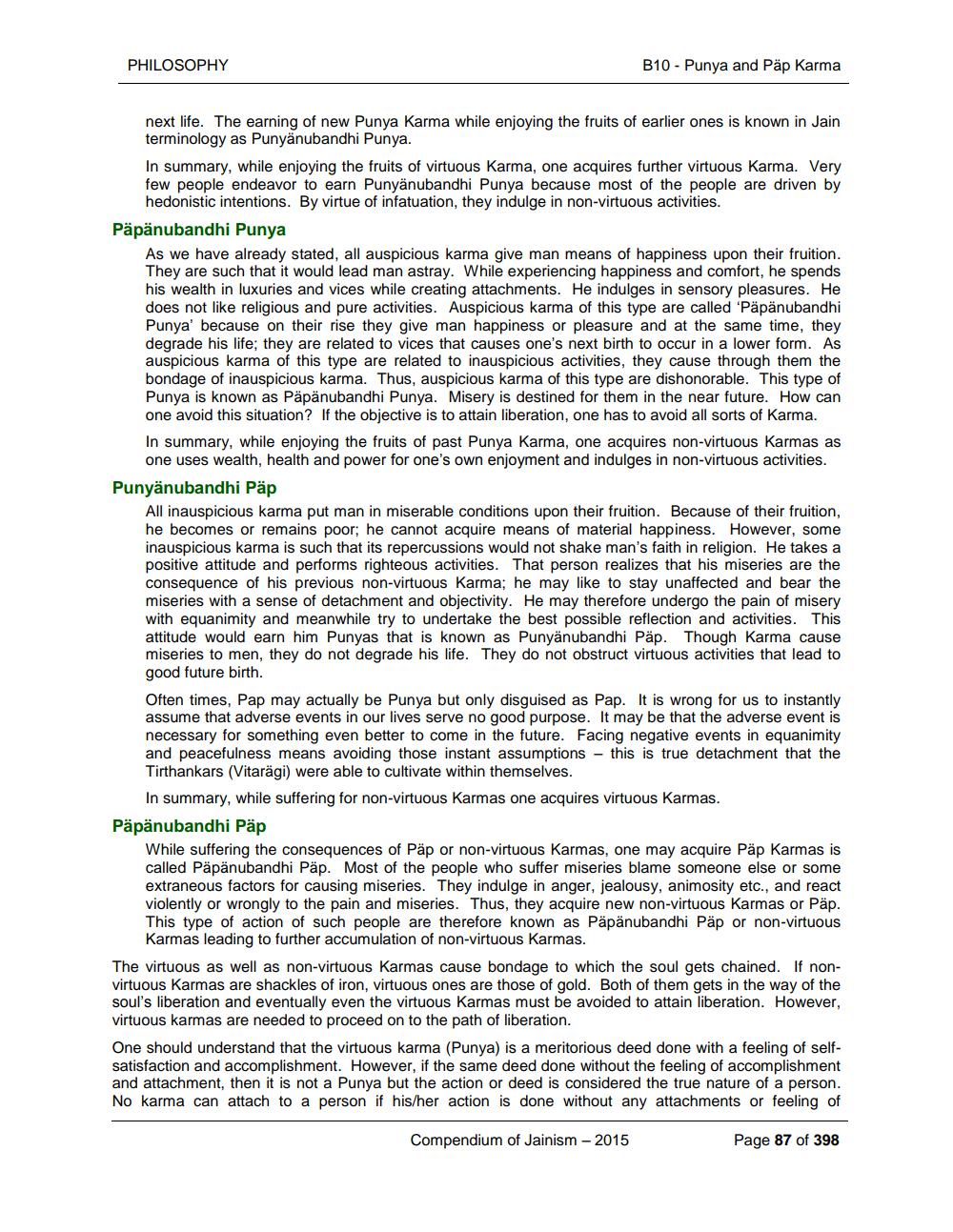________________
PHILOSOPHY
B10 - Punya and Pap Karma
next life. The earning of new Punya Karma while enjoying the fruits of earlier ones is known in Jain terminology as Punyänubandhi Punya. In summary, while enjoying the fruits of virtuous Karma, one acquires further virtuous Karma. Very few people endeavor to earn Punyänubandhi Punya because most of the people are driven by
hedonistic intentions. By virtue of infatuation, they indulge in non-virtuous activities. Päpänubandhi Punya
As we have already stated, all auspicious karma give man means of happiness upon their fruition. They are such that it would lead man astray. While experiencing happiness and comfort, he spends his wealth in luxuries and vices while creating attachments. He indulges in sensory pleasures. He does not like religious and pure activities. Auspicious karma of this type are called 'Päpänubandhi Punya' because on their rise they give man happiness or pleasure and at the same time, they degrade his life; they are related to vices that causes one's next birth to occur in a lower form. As auspicious karma of this type are related to inauspicious activities, they cause through them the bondage of inauspicious karma. Thus, auspicious karma of this type are dishonorable. This type of Punya is known as Päpänubandhi Punya. Misery is destined for them in the near future. How can one avoid this situation? If the objective is to attain liberation, one has to avoid all sorts of Karma. In summary, while enjoying the fruits of past Punya Karma, one acquires non-virtuous Karmas as
one uses wealth, health and power for one's own enjoyment and indulges in non-virtuous activities. Punyänubandhi Päp
All inauspicious karma put man in miserable conditions upon their fruition. Because of their fruition, he becomes or remains poor; he cannot acquire means of material happiness. However, some inauspicious karma is such that its repercussions would not shake man's faith in religion. He takes a positive attitude and performs righteous activities. That person realizes that his miseries are the consequence of his previous non-virtuous Karma; he may like to stay unaffected and bear the miseries with a sense of detachment and objectivity. He may therefore undergo the pain of misery with equanimity and meanwhile try to undertake the best possible reflection and activities. This attitude would earn him Punyas that is known as Punyänubandhi Päp. Though Karma cause miseries to men, they do not degrade his life. They do not obstruct virtuous activities that lead to good future birth.
Often times, Pap may actually be Punya but only disguised as Pap. It is wrong for us to instantly assume that adverse events in our lives serve no good purpose. It may be that the adverse event is necessary for something even better to come in the future. Facing negative events in equanimity and peacefulness means avoiding those instant assumptions - this is true detachment that the Tirthankars (Vitaragi) were able to cultivate within themselves.
In summary, while suffering for non-virtuous Karmas one acquires virtuous Karmas. Päpänubandhi Päp
While suffering the consequences of Päp or non-virtuous Karmas, one may acquire Päp Karmas is called Päpänubandhi Päp. Most of the people who suffer miseries blame someone else or some extraneous factors for causing miseries. They indulge in anger, jealousy, animosity etc., and react violently or wrongly to the pain and miseries. Thus, they acquire new non-virtuous Karmas or Päp. This type of action of such people are therefore known as Päpänubandhi Päp or non-virtuous Karmas leading to further accumulation of non-virtuous Karmas.
The virtuous as well as non-virtuous Karmas cause bondage to which the soul gets chained. If nonvirtuous Karmas are shackles of iron, virtuous ones are those of gold. Both of them gets in the way of the soul's liberation and eventually even the virtuous Karmas must be avoided to attain liberation. However, virtuous karmas are needed to proceed on to the path of liberation.
One should understand that the virtuous karma (Punya) is a meritorious deed done with a feeling of selfsatisfaction and accomplishment. However, if the same deed done without the feeling of accomplishment and attachment, then it is not a Punya but the action or deed is considered the true nature of a person. No karma can attach to a person if his/her action is done without any attachments or feeling of
Compendium of Jainism - 2015
Page 87 of 398




